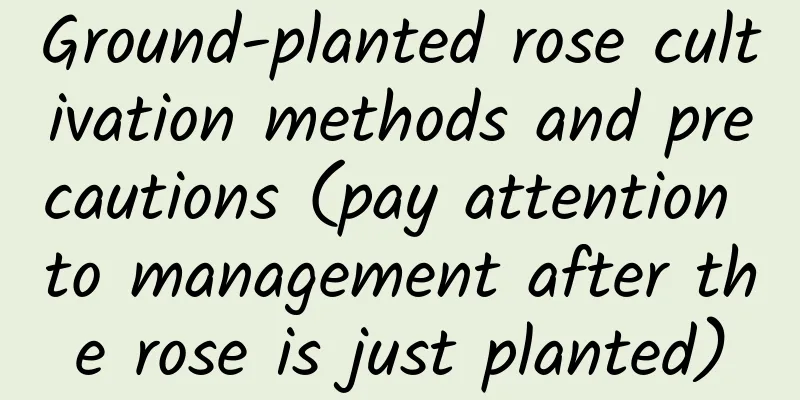Ground-planted rose cultivation methods and precautions (pay attention to management after the rose is just planted)

Choose a suitable planting siteGround-planted roses have strong growth capabilities, strong root systems, and many flowers. The premise of all this is to choose a good location. There are two requirements for a location suitable for the growth of roses. ① Plenty of sunshineRose is a light-loving flower and has relatively high requirements for light. This requirement must be met whether it is potted or planted in the ground. This should be considered first when choosing a location. The planting location should be directly exposed to the sun, without any obstructions such as large trees or houses. Only when there is sufficient light can the ground-planted roses grow well and bloom more. ② Good terrainIn addition to light for the plants, terrain is another factor to consider. Low-lying areas are usually not suitable for growing roses, because water is prone to accumulation in low-lying areas during rainy seasons, which is not conducive to the growth of roses. Generally speaking, a suitable place should be one with flat or slightly higher terrain and good drainage and flood control conditions. Choosing the right rose variety for ground plantingThere are many varieties of roses. Ground-planted roses have obvious advantages because their roots can grow deep. In theory, all varieties are suitable for ground planting. However, we must consider the advantages of ground planting and give full play to this advantage . It is recommended to choose some climbing roses or large shrub roses. These two types of roses grow fast and bloom a lot. It is difficult for potted roses to bloom, but it is easy to bloom when planted in the ground. It is not recommended to plant miniature or ultra-miniature roses . Ultra-miniature roses planted on the ground look totally out of place and a bit like a waste of talent. Key points for maintenance and management of ground-planted rosesGround-planted roses are planted directly on the ground, which is very down-to-earth. Generally, the management of ground-planted roses is relatively extensive, and they can grow very well without too much attention to watering and fertilizing. Below I will briefly talk about the four points that need attention: watering, fertilizing, pruning, and pests and diseases. ① WateringGround-planted roses can rely on rainwater, and generally do not need to be watered. However, in the first few days after transplanting, they need to be watered once a day to promote root growth . In addition, watering is still necessary when encountering long-term drought weather. ② FertilizationFertilization of ground-planted roses does not need to be as meticulous as potted roses. The interval between fertilization can be longer and the amount of fertilizer can be slightly larger. The key fertilization period for ground-planted roses is after winter dormancy, and sufficient organic fertilizer should be buried as base fertilizer. In addition, when planting, we can generally bury organic fertilizers such as fish intestines and chicken intestines. They need to be buried deeper to prevent cats and dogs from digging them out. ③ PruningShrub roses can be pruned in winter by heavy pruning, while climbing roses should not be pruned by heavy pruning. Generally, you only need to cut off some weak and dry branches in winter. For climbing roses, pay attention to renewing branches and renewing aging branches in time. ④ Pest and disease preventionThe diseases and insect pests of roses planted in the ground are often more serious than those of potted roses, because you will look at them every day. But you may not even look at them for ten days or half a month, so once they are infected with diseases and insect pests, they are more serious. Therefore, you must not be careless about the diseases and insect pests of roses planted in the ground, and spray them with pesticides immediately once you find them . |
Recommend
Persimmon growth environment conditions and characteristics
Persimmon Growth Environmental Conditions and Req...
Spring vegetable planting time and method
Spring vegetable planting time Spring vegetables ...
How to grow tobacco in autumn
1. Autumn maintenance is very important Fall care...
What are the climbing roses that bloom all year round?
1. Open varieties 1. Western Earth: Its flowers a...
What should I do if the leaves of the weeping angel have become soft?
1. Reasonable exposure to light The weeping angel...
How to cultivate dragon fruit
Dragon Fruit Growing Conditions Dragon fruit like...
How to care for rubber trees in winter
Farming methods In winter, the first thing to pay...
What is the best water for Clivia?
1. Tap water This is the most common option and d...
Feng Shui Application of Household Lotus
Application of Feng Shui in the cultivation of lo...
The efficacy and function of Chonglou
1. Medicinal origin This plant has a long history...
Ginseng transplanting method
1. Transplanting time Ginseng is usually transpla...
How to grow green plants fast and vigorously at home (how to grow good green plants indoors)
1. Understand the growth habits of plants First o...
How to propagate Jasper Lotus and what to pay attention to
Jade Lotus Reproduction Method Jade Lotus is gene...
When is the best time to prune the iron tree?
Pruning time for iron trees Pruning of cycads is ...
What pots should be used to grow spider plants? How to judge whether spider plants need to be repotted?
1. What basin to use When growing spider plants, ...









